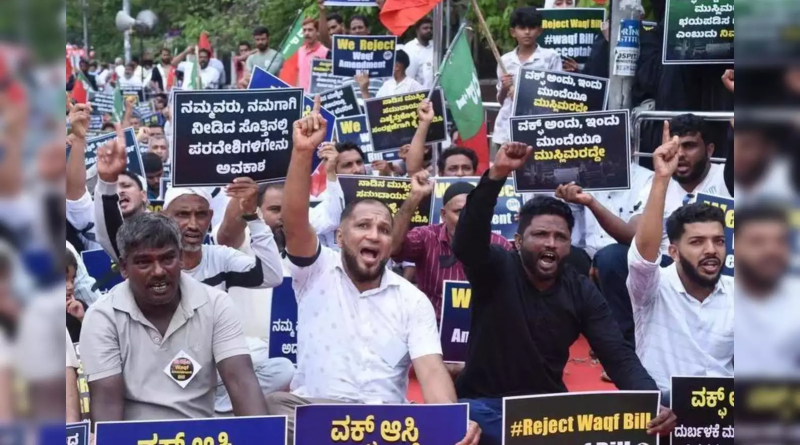Wake-Up Call for Indian Muslims—The Politics of Protest and the Waqf Amendment Bill
Time and again, emotional appeals for street protests have been presented as the only recourse—akin to a one-size-fits-all remedy.
Last week, India’s Parliament passed the Waqf Amendment Bill, a piece of legislation aimed at reforming the management of Islamic charitable endowments known as Waqf properties. This move has sparked significant unease among Muslim organizations, civil society groups, and opposition political parties in the country. Despite appeals to India’s President, Droupadi Murmu, to withhold her approval, the bill has now been enacted into law.
Prominent political figures, including Muslim parliamentarians such as Asaduddin Owaisi of the All India Majlis-e-Ittehad Muslimeen, Mohammed Jawed of the Indian National Congress, and Amanatullah Khan, a Delhi legislator and chairman of the local Waqf Board from the Aam Aadmi Party (AAP), have filed legal challenges in India’s Supreme Court, questioning the bill’s alignment with the nation’s constitution.
In contrast, Sanjay Raut, a member of parliament from Shiv Sena (UBT)—a regional political party—has indicated his party’s decision not to oppose the legislation, suggesting a divergence of views even among the government’s critics.
India’s ruling Bharatiya Janata Party (BJP)-led central government defends the bill, asserting it is in the nation’s best interest. Key officials, including Kiren Rijiju, the Minister of Minority Affairs, and Amit Shah, the Minister of Home Affairs, have repeatedly emphasized that the law does not infringe on Muslim rights. Instead, they argue it seeks to improve the efficiency of Waqf Boards—bodies responsible for overseeing these endowments. The government has dismissed opposition claims that the bill undermines constitutional protections as baseless.
Nevertheless, a coalition of Muslim organizations, individuals, and opposition parties continues to argue that the legislation threatens the sanctity of mosques and graveyards managed under Waqf. Labeling it unconstitutional, these groups are mobilizing for nationwide protests, including large-scale sit-ins and street demonstrations, to demand the law’s repeal.
The Historical Context of Waqf Management
Before jumping to support calls for protests, it’s worth exploring the historical management of Waqf properties—endowments established under Islamic law for charitable purposes—since India’s independence in 1947. This moment of controversy offers a chance to reflect on how these assets, meant to serve religious and social welfare, have been handled over decades.
A 2011 report by the Sachar Committee, a government-appointed panel studying the socio-economic conditions of Indian Muslims, alongside data from the Central Waqf Council, revealed that over 50% of Waqf land in India is either encroached upon or tangled in legal disputes—a striking indicator of systemic mismanagement across regions and political regimes.
In Telangana, a southern Indian state never governed by the BJP, approximately 75% of Waqf land is reportedly encroached upon, with the figure rising to 82% in its capital, Hyderabad. This underscores that the problem transcends any single political party or central policy. These statistics challenge the narrative that the current uproar is solely a result of the national government’s actions and prompt scrutiny of the role local Waqf Boards and regional leaders played in allowing such widespread losses to occur.
The Gap Between Rhetoric and Results
For decades, the administration of Waqf properties—intended to fund education, healthcare, and welfare initiatives—has failed to deliver on its charitable promise. Despite controlling vast assets, the benefits to India’s Muslim community remain limited. This raises pressing questions about who has truly profited from Waqf properties since India’s independence, who bears responsibility for the encroachments, mismanagement, and misuse of these lands, and how many schools, hospitals, or welfare centers have been established using Waqf resources.
Furthermore, what actions were taken against those who exploited these endowments, and in what measurable ways has Waqf contributed to the economic advancement of Muslims? Calls for accountability and reform in Waqf management should have surfaced long ago. Instead, the same organizations now rallying for protests—many of which oversaw this decline—are accused of stirring emotions for political leverage.
Critics argue these self-proclaimed “guardians” of the Muslim community have historically mismanaged Waqf resources, often prioritizing personal or political gain over communal welfare.
The Myth of Wake-Up Calls
Much has been said about “wake-up calls” to galvanize India’s Muslim community. Yet, the reality suggests that community leaders and Waqf custodians were never dormant—they were simply focused elsewhere.
Many Waqf properties have been illegally occupied, with rents kept artificially low, allowing beneficiaries to exploit them for decades without oversight or adjustment. This pattern of neglect raises doubts about the sincerity of those now decrying the new law.
The Pattern of Response to Legislation
A recurring trend emerges in how certain groups react to laws perceived to affect Muslim interests in India. When the Citizenship Amendment Act (CAA) and National Register of Citizens (NRC) were introduced—policies aimed at streamlining citizenship processes—similar fears were ignited, with claims that Muslims would be stripped of citizenship. Years after the CAA’s implementation, no widespread evidence of such disenfranchisement has emerged.
This history prompts questions about the opposition to the Waqf Amendment Bill: Are objections rooted in genuine threats to religious rights, or do they reflect an automatic resistance that ultimately serves political agendas rather than community well-being?
The Human Cost of Protest Without Protection
Time and again, emotional appeals for street protests have been presented as the only recourse—akin to a one-size-fits-all remedy.
During the CAA-NRC protests, fears of mass citizenship loss fueled widespread unrest. Yet, as Minister Kiren Rijiju noted during the Waqf bill debates, no Muslims have lost citizenship under CAA. Still, the fallout from such movements lingers: young Muslims arrested during protests against CAA, NRC, and earlier laws like the Triple Talaq ban often remain in jail, lacking legal or financial support from the groups that spurred them into action.
In Muzaffarnagar, a city in northern India, 24 Muslim youths faced legal notices simply for wearing black armbands as a symbolic dissent—not even a full protest—each required to post a ₹2 lakh (approximately $2,400 USD) bond. In Ahmedabad, a western Indian city, around 40 people were detained during demonstrations.
These cases highlight the risks to ordinary citizens when protests lack strategic planning, legal backing, or institutional support.
Before heeding new calls to protest, communities deserve to know whether organizers have secured proper permissions from authorities, are prepared to provide legal aid to those arrested, have a legal team in place, will accept responsibility for the outcomes, and will support the families of detainees financially and emotionally.
The Path Forward: Reform and Accountability
The current Waqf management system demands overhaul. Transparency, accountability, and effectiveness must take precedence over political maneuvering. Rather than blanket opposition, India’s Muslim community could benefit from demanding targeted amendments to problematic clauses in the bill instead of outright rejection, proposing governance models that balance religious autonomy with accountability, establishing independent oversight to track how Waqf resources serve the community, creating forums for community input into Waqf decisions, and developing long-term plans to leverage Waqf assets for education, healthcare, and economic growth.
From Reaction to Responsible Engagement
India’s Muslim community faces a pivotal choice. The current approach lacks strategy, unified leadership, negotiation, or internal reform—just a repetitive cycle of politicization until issues reach the courts. Continuing this pattern of protest and division is an option, but so is redirecting energy toward ensuring Waqf properties fulfill their charitable mission. The community must resist further manipulation.
For decades, Waqf assets have been plundered while leaders stood by. Now, as the government pushes for accountability, some of these same figures are accused of misleading the public once more.
True leadership goes beyond rallying crowds—it requires vision, strategy, and responsibility. By advocating for reforms that bring transparency and efficiency to Waqf management, the community can ensure these resources uplift its most vulnerable members and build enduring institutions for future generations.
The challenge is not merely whether to oppose a law, but how to ensure the sacred trust of Waqf serves its intended purpose: benefiting the community it was created to support.
Disclaimer: Views expressed by writers in this section are their own and do not reflect Milli Chronicle’s point-of-view.



